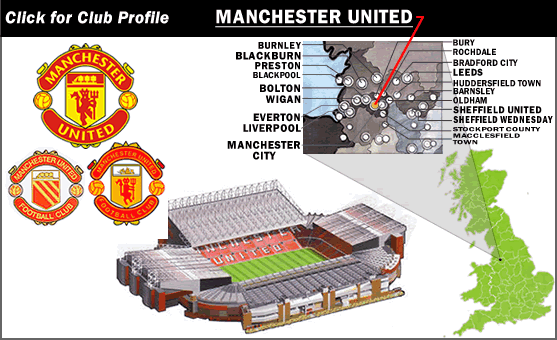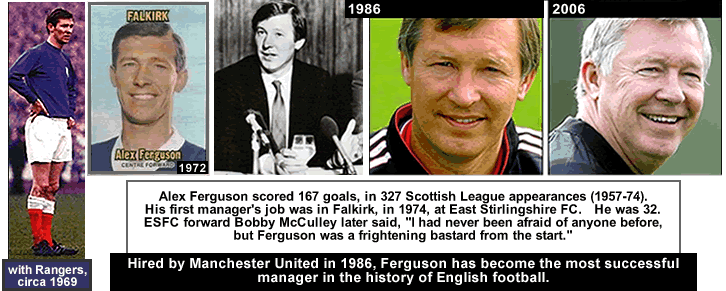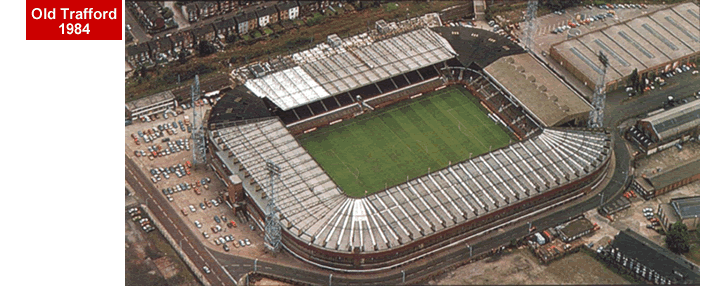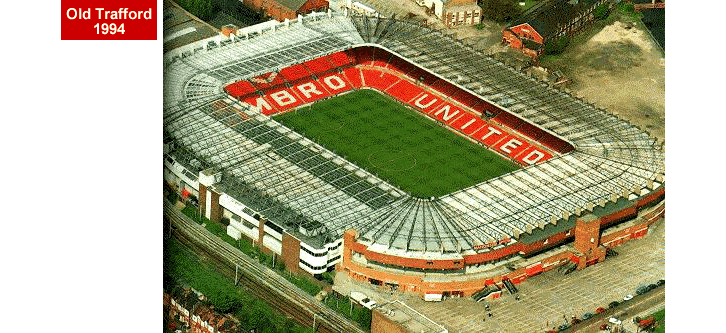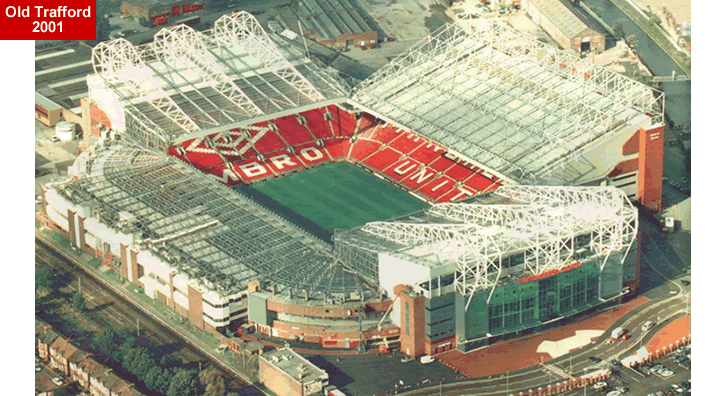Alex Ferguson’s first few seasons as manager of Manchester United were not successful, and he was on the verge of being sacked in early 1990. But a good Cup run kept him from getting the hook. United went on to win the 1990 FA Cup, over Crystal Palace, in the replay, with Lee Martin scoring the lone goal. During this period, their goals came primarily from Brian McClair, who was the first player since George Best to score 20 goals in a season for the club (McClair netted 24 in the League in ’88).
The club finished in 13th place in 1990. They started heading in the right direction though, with finishes of 6th place, in ’91, and then 2nd place, in ’92. But a late season slump saw them lose the Title to rivals Leeds United. There was some consolation in winning their first League Cup that year, though. They beat Nottingham Forest 1-0, with McClair scoring. The club aquired striker Eric Cantona from Leeds in November 1992, much to the dismay of Yorkshire fans, but the mercurial Frenchman had butted heads with management there. Actually, Cantona had butted heads with a lot of people, and had come to England to resurrect his career. Cantona energized Manchester United, racking up goals, and providing opportunities for the rest of the team. He formed a formidible partnership with forward Mark Hughes. **{ See video highlights of Eric Cantona. The Long version, here. The one goal that sums up Eric Cantona, here.}** The squad also featured Danish goalkeeper Peter Schmeichel (who some say was Ferguson’s greatest discovery); defenders Dennis Irwin, Steve Bruce, and Gary Pallister; midfielder Paul Ince; as well as the young midfield prodigy Ryan Giggs. Manchester United won the Title that season (1992-93), their first League crown since 1967. 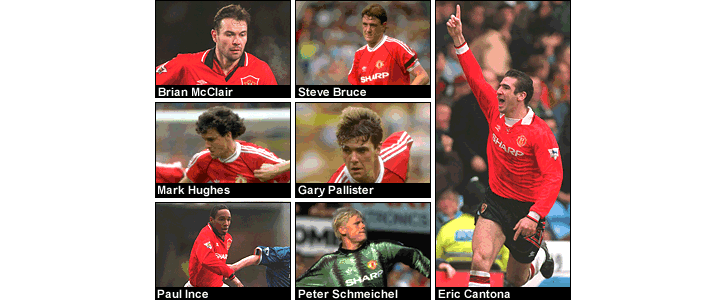
A 17-year old David Beckham made his debut for the club that season. That summer, Roy Keane joined the club, from Nottingham Forest, for a then-record 3.75 million pound fee. Ferguson pegged Keane to replace long-serving field general Bryan Robson, who was nearing the end of his career. Notable players who would make their debuts for Manchester United in the next couple years included fullback Gary Neville, in 1992; defensive midfielder Nicky Butt, in 1993; unassuming midfield wizard Paul Scholes, in 1994; and fullback Phil Neville, in 1994. Together with Keane, Giggs, and Beckham, these players would form the core of Ferguson’s championship-winning squads for years to come. As with legendary manager Matt Busby, Ferguson would build his dynasty on a foundation of home-grown talent and youth. **{See video highlights of : David Beckham, here. Ryan Giggs, here. Roy Keane, here. Paul Scholes, here.}**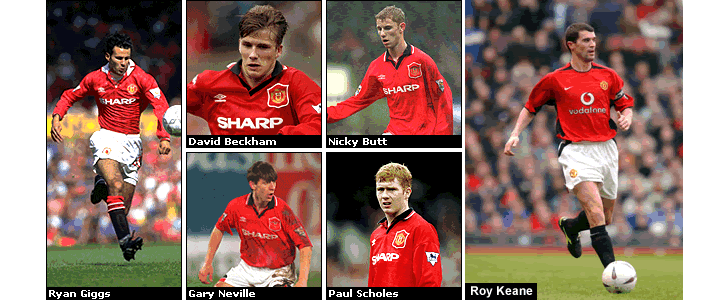
1992-93 season had been the inaugural season for the Premier League. In a few years, it would be as if Manchester United owned the new league. They repeated as champions the next year (1994). They were pipped by surprise Blackburn Rovers on the final day, in 1995, but then won back-to-back Titles in ’96 and ’97. They finished second to Arsenal in ’98, and then won the Title three straight years: 1999, 2000, and 2001. They finished third in 2002, but bounced back to re-claim the crown in 2003. That made it 8 championships in 11 years, an unprecedented feat in English football history. During this period, Manchester United also made it to 4 FA Cup Finals, winning 3. In 1994, they beat Chelsea 4-0, with Cantona scoring twice from the penalty spot, and Mark Hughes and Brian McClair also tallying. The next year (’95), they lost the Cup Final to Everton, 0-1, but the following year (’96), the club won their 9th FA Cup, beating Liverpool 1-0, with Cantona winning it in the 85th minute. They won their 10th FA Cup in 1999, beating Newcastle 2-0, with Teddy Sheringham and Paul Scholes scoring.
1999 was Manchester United’s greatest season. After winning the League, and the FA Cup, they made it to the European Cup Final, at the Nou Camp, in Barcelona, Spain. Their opponent was Bayern Munich, the biggest club in Germany. An early goal by Bayern’s Mario Basler seemed to be about to hold up, as stoppage-time began. German fans had already begun celebrating, lighting flares. Manchester United won a corner, and Teddy Sheringham re-directed a Ryan Giggs mis-hit into the net to even the score. About 2 minutes later, as time was almost up, another corner as won by the Red Devils. David Beckham arced the ball in, which was head-flicked by Sheringham right into the path of Ole Gunnar Solskjaer in front of the goal. The Norwegian instinctively stabbed the ball into the net. In virtually the last play of the game, Manchester United had won it. It was one of the greatest comebacks in the history of cup football. Manchester United had won the Treble. **{See the highlights of Manchester United’s 1999 European Cup victory, here.} {See a tribute to the 1999 Treble.}**
By this time, Manchester United had become one of the biggest sports clubs on the planet. The club began ambitious plans to expand Old Trafford. The stadium reached a 68,000 all-seating capacity in 2000. And in 2006-07, the upper-tier quadrants were filled in, making the present capacity 76,000. (Further plans for expansion are being hampered by railway tracks, and residential housing, behind the South Stand.)
Manchester United was the object of a successful takeover bid, by American tycoon Malcolm Glazer, in 2005 {see this article}. The club failed to win the Title for a 3-year spell, from 2004-06. But they won the FA Cup, in 2004, beating Milwall 3-1, with goals by Ruud van Nistelrooy (twice), and Christiano Ronaldo; and the League Cup, in 2006. By this time, Alex Ferguson had re-built the squad. Wayne Rooney (the best young player in England); and Christiano Ronaldo (the Portuguese phenom who was voted FIFA 3rd best Footballer of the Year for 2007) led the squad to their 16th League Title in 2007.
Alex Ferguson had planned on retiring in 2002. He doesn’t talk about that too much these days, but he is getting on in years (he will be 66 on New Year’s Eve). He has recently said that the current squad, bolstered by new additions like Argentine sensation Carlos Tevez, midfielder Owen Hargreaves, and the young Portuguese winger Nani, is the best he has ever assembled.
Frequently Asked Question: Why are Manchester United called “the Red Devils” ? {Click, for answer.}
Thanks to: Historical Football Kits (historicalkits[dot]co[dot]uk): the 5 older kits on the chart are copyright Historical Football kits, and used by kind permission:; Colours Of Football (colours-of-football[dot]com): the newer kits on the chart are from this fine site; BBC (bbc[dot]co[dot]uk); Man. United Zone (manutszone[dot]com); Bob’s 1970-71 Footballers (bob7071[dot]co[dot]uk).
